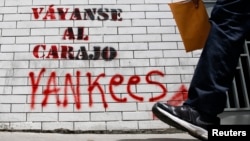Tensions between the United States and Venezuela intensified Tuesday over new U.S. sanctions, with the move also drawing fire from Venezuela's Latin American allies.
Venezuelan President Nicolas Maduro, who criticized the measures against seven Venezuelan officials as "unjust" and "harmful" after they were announced Monday, was seeking special legislative powers to confront what he labeled U.S. imperialism.
Cuba also denounced the sanctions, calling the executive order by U.S. President Barack Obama "arbitrary and aggressive" in an official statement published by the state-run Granma newspaper. Ecuador's president, Rafael Correa, meanwhile, slammed the move on social media, saying it must be "a bad joke."
The outcry over the order marks the first public clash between the U.S. and Cuba since the two nations announced in December they would begin talks on restoring diplomatic ties.
The United States says the officials targeted in the order violated human rights and engaged in public acts of corruption. They include the head of Venezuela's intelligence service and the director of its national police.
Drug Trafficking Links?
Cecilia Sosa, former chief justice of Venezuela's Supreme Court, told VOA's Spanish branch the U.S. could be basing its categorization of Venezuela as a national security threat on Venezuelan officials' apparent illicit activities in relation to drug trafficking.
A statement by the U.S. Treasury Department Monday appeared to support that assessment, saying the sanctions will serve "to protect the U.S. financial system from the illicit financial flows from public corruption in Venezuela."
"Corrupt actions by Venezuelan government officials deprive Venezuela of needed economic resources that could be invested in the Venezuelan people and used to spur economic growth," said the statement.
In its 2014 drugs report, the U.S. State Department said Venezuela was "one of the most frequently-transited" routes for illegal drugs leaving South America, due to its "permeable western border with Colombia, weak judicial system, sporadic international counternarcotics cooperation, and permissive and corrupt environment."
Venezuela, meanwhile, has expressed its commitment to fighting drug trafficking, even as allegations surfaced earlier this year that Venezuela's National Assembly President Diosdado Cabello, considered the nation's second-most-powerful figure, was the head of a drug-trafficking ring. Both Cabello and President Maduro denied the reports.
Rising Tensions
Robert Valencia, an analyst who writes for the World Policy Institute, said it is also important to remember that President Obama's decree comes after Venezuela took its own actions against American officials.
Last week, Caracas ordered Washington to reduce the number of officials at the U.S. embassy from 100 to 17 and imposed a visa requirement for American tourists.
A White House statement on the sanctions Monday pointed to concerns over Venezuela's treatment of dissidents.
"We are deeply concerned by the Venezuelan government's efforts to escalate intimidation of its political opponents,'' said the statement. "Venezuela's problems cannot be solved by criminalizing dissent."
The White House called on Venezuela to release all political prisoners, including opposition leader Leopoldo Lopez, mayors Daniel Ceballos of San Cristobal and Antonio Ledezma of Caracas and dozens of students.
Valencia said Venezuela as a whole is not likely to be affected by the U.S. action. "They are sanctions against seven officials, in [President] Nicolas Maduro's security leadership," he said. "This in no way represents a sanction against the general population, even though [President] Maduro claims to see it as such."
Valencia said despite the sanctions, the economic relationship between the U.S. and Venezuela, particularly in the area of energy, will continue. In 2013, the State Department named Venezuela one of the top five suppliers of foreign oil to the United States.
State Department spokeswoman Jen Psaki said Tuesday the sanctions are directed at individuals, "not the Venezuelan people or the economy."
"The United States remains an important trading partner, is actually Venezuela's largest trading partner, and despite the statements to the contrary from Venezuelan officials, we are not promoting instability in Venezuela," she told reporters.
"Rather," she added, "we believe respect for democratic norms and human rights is the best guarantee of Venezuela's stability. Hence, our executive order. So, allegations that these actions are an attempt to undermine the Venezuelan government are false. The goal of these sanctions is to persuade the government of Venezuela to change their behavior."
In its statement Tuesday, the Cuban government, which has long been Venezuela's closest ally, said it reiterates its "unconditional support" for Venezuela, adding that "no one has the right to intervene in the internal affairs of a sovereign state."
President Maduro often criticizes the United States for what he says is meddling in his country's affairs. The U.S. and Venezuela have not exchanged ambassadors since 2010.
VOA's Spanish Branch contributed to this report.





